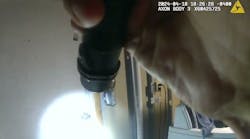June 16--CHANDLER -- A phone call from a salesman may have saved countless lives on June 16, 1992.
When an F-5 tornado ripped through southwest Minnesota that Tuesday, the devastation and destruction was massive, racking up millions of dollars in damage and leaving countless people homeless. By some miracle, no one died that night, although one woman, Bertha Youngsma, succumbed to injuries sustained in the storm and died weeks later.
Former Chandler Fire Chief Cal Tinklenberg received a call from the salesman he had just finished speaking with at the cabinet shop he co-owns.
"I think there's a tornado headed your way," the man reported.
Without hesitation, Tinklenberg dropped what he was doing and made a phone call to Murray County Dispatcher Terri Prins, putting everyone on immediate alert. Looking back, he's glad he made that move.
"I don't know if we would have gotten everyone going in time," he said. "It was more than just a lucky chance."
Storm spotters, Tinklenberg included, headed out to keep an eye on things. A rescue rig and two fire trucks were mobilized and Tinklenberg made a pass through Main Avenue, telling people this was for real and to take cover. Then he headed home to check on his daughter.
"Things really started coming apart then, and 6- to 8-inch limbs were hitting my pickup, and there was hail the size of my fist," Tinklenberg said.
He and his 19-year-old daughter headed for the basement, and in her arms she clutched a wrapped birthday gift. It was Tinklenberg's birthday, and she wanted to save his present.
"I pushed her into a corner that had concrete on two sides," he said.
Right around that time, Murray County Sheriff Ron McKenzie was on Murray County 4 at the top of the hill that overlooks the town of Chandler. It was as far as he could go, because he suddenly couldn't see or hear anything.
"We had gotten the call around 4:30 or 5 p.m. that day, so I moseyed over that way," McKenzie said. "I got to the hill by the cemetery and then (the tornado) hit."
Between static and the noise of the storm, McKenzie couldn't hear much over his radio. Back at dispatch, the county was in the middle of changing radio consoles, and Prins was literally working off a card table in the middle of the dispatch center.
"She was blowing off sirens, all the while knowing the tornado was hitting her hometown," McKenzie stated.
Through the static, he could hear Minnesota State Trooper Larry Rosenberg "hollering at Lake Wilson, letting them know it was coming." Sitting in his squad car and hoping he didn't get blown over or sucked up, McKenzie could do nothing but wait. The tornado passed, and he could see the damage.
"I could see that part of the elevator was gone which was owned by the dispatcher's parents. I remember pulling into town and telling her the house was OK, but the elevator was shorter," McKenzie said. "I got onto main street a bit, but then the road was completely littered with debris."
People were slowly coming out of buildings, cautiously looking at the sky and around them in bewilderment. Each and every one had a dazed look on their face, McKenzie recalled.
"One of the Schuurs come out of his shop and looked around, then saw me," he said. "He hollered out, 'What should I do?' I asked him if he had a payloader in there. He said yes, so I told him to clear me a path down main street so I could get to the school."
McKenzie cautioned the man to be careful of wires across the road, and then Schuur jumped in the payloader and began making a path through grain bins, semis on their side, and mountains of debris.
Down the street a bit, Tinklenberg became aware the noise of the storm had abated. He found himself lying in his basement on some railroad ties and buried under sheetrock, doors and debris. The actual passing of the tornado was mostly a blur, but he does remember the static electricity bouncing around the area looked like bolts of lightning.
"It was kind of like being in a blender on high," he said.
He heard a high screeching sound, realizing later it was the noise made by Schuur's payloader pushing debris off the road. He started move and accidentally bumped something by his shoulder -- it was his hand-held fire department radio.
"I started talking to the guys, who were coming out from their basements and places of hiding. I could hear them saying, 'Where are we?' because all landmarks were gone," Tinklenberg said. "I called dispatch and told them to send help."
"How much help do you need?" he was asked.
"Call them until they can't send anymore," he replied.
There were still firefighters at the station, and even though the doors blew off and got trapped on the trucks' drive shafts, the members hit the streets, beginning a house-by-house search for victims. The west end of Chandler had taken the brunt of the attack, and people were buried in their basements.
Tinklenberg's daughter was able to dig herself out of the debris in which she was buried, but when he attempted to stand, his leg gave way beneath him. He mentioned dragging himself to his truck to go help in the search, and his daughter had to break the bad news -- his truck was nowhere to be seen.
McKenzie had checked the school, and by then emergency managements had begun to show up -- EMTs and ambulances were arriving, and the fire department was taking care of their town, he said.
"I was still listening to Rosenberg screaming that it was hitting Lake Wilson," he said.
Firefighters had gotten around to Tinklenberg's house and dug him out of his basement debris. He had told them he would need a backboard, thinking something was wrong with his hip, but once they strapped him in, he argued about leaving the scene. Finally they agreed to prop the backboard against a decorative rock in his neighbor's yard.
Strapped to a backboard and propped up on the rock, Tinklenberg used his radio to coordinate the rescue efforts.
An emergency center had been set up at one of the area churches, and eventually Tinklenberg gave in and allowed himself to be transported to the church. He was surprised to find how few people had been seriously injured.
Later he was transported to the Slayton hospital, where he learned his pelvis had been broken in three places. He was in the hospital for 16 days or so, and each morning the nurses would change his sheets and find sand. He had been buffeted by grains of sand flying at such speeds they embedded deep into his skin. It took almost two years for the last bits of sand and slivers to emerge from his body, he said.
While he was being transported to the hospital, McKenzie was still working on rescue and cleanup efforts. The National Guard was called in, and it didn't take long for looky- loos and gawkers to start showing up in town.
"Nobles County came up, Lyon County came down, and I had them start checking the farm places," McKenzie said. "There were 60-some farms hit, and five or six of those were totally destroyed."
Worthington Police Officer Chris Heinrichs, who had worked as law enforcement in Murray County for several years, was first sent to Leota, but then sent on to Chandler.
"I could see the relief in (McKenzie's) face when he saw me, knowing that I knew that county," said Heinrichs, who is now the Nobles County Chief Deputy. "He asked us to check the north end of his county. We ended up going up to the Shetek area, and even as far up as the county line."
Up at the Murray/Lyon County line on U.S. 59, two farms had serious damage, and cattle had been picked up at one farm and dropped on the other side of the road.
"They were wandering around dazed and confused, but they were fine," he marveled.
Because there were power lines down all over the road, Heinrichs and his colleague ended up stopping all traffic on the highway for quite a while. When they headed back to Worthington, all power was off in Slayton, and the officers were seriously concerned about having enough gas to make it home.
McKenzie went into talks with the city officials in Chandler, trying to decide what to do with the large media outlets that began arriving in town. Big trucks, helicopters and news crews from all over flocked to the area.
In the days to follow, no one was allowed into Chandler or Lake Wilson without identification. It didn't take long for looters to show up, and at times Minnesota 91 was backed up with vehicles trying to get into the towns. Different volunteer groups were coming to town to feed people, and work crews were coming in to clean and repair. At one point, people in Chandler complained to McKenzie that electric crews were working on the lines on Sunday, which they didn't like. After consulting with the companies, he had to go back and tell them if the companies left, they weren't coming back.
A news helicopter allowed deputies to go up into the air to check fields for people, and the game warden was sent out to dispatch animals that had been wounded. During the first few days, McKenzie reported to commissioners that the budget was gone, but progress was being made.
After two weeks, the National Guard was released. Life, while it would never be normal, was taking on a rhythm.
"I'm just thankful that the damage to people was relatively minor," he said. "I felt bad --just the looks on people's faces, the despair. It just hits you."
Tinklenberg said it took a few years before he felt life was normal again. Some things would forever remain a mystery, such as the whereabouts of his 1948 sports car, but one thing fire department and law enforcement personnel agree on is the way people came together, allowing their training to take over and doing the jobs that needed to be done.
"In the hospital I replayed it all in my head, thinking about over and over," he admitted. "It was an experience, one that maybe we weren't prepared to cope with. But we did."
Daily Globe Reporter Justine Wettschreck may be reached at 376-7322.
Copyright 2012 - The Daily Globe, Worthington, Minn.


